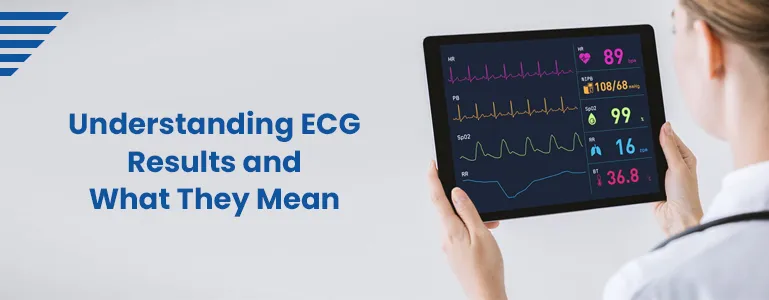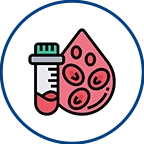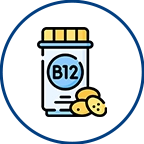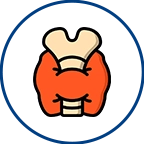Understanding ECG Results and What They Mean

The Electrocardiogram (ECG) is more than just a series of squiggly lines on paper; it's a window into the intricate electrical symphony that orchestrates your heart's rhythm. Understanding your ECG results and what they mean empowers you to grasp the health of your heart and collaborate effectively with your healthcare provider. In this blog, we'll embark on a journey to demystify ECG results, providing you with the knowledge to decode the patterns and gain insights into your cardiovascular well-being.
Decoding the ECG Graph
At first glance, an ECG graph might seem perplexing, but it holds valuable information about your heart's electrical activity. The graph consists of waves and intervals, each representing a distinct phase of your heartbeat. These include the P-wave, QRS complex, and T-wave, among others. By understanding these components, you can start deciphering your heart rhythm's story.
Home Sample Collection
Recognizing Normal vs. Abnormal Patterns
A key aspect of interpreting ECG results is identifying normal versus abnormal patterns. A normal ECG showcases consistent wave shapes and intervals, indicating a healthy heart rhythm. Deviations from these norms may indicate potential issues, such as arrhythmias or other cardiac abnormalities. Your medical professional will evaluate your outcomes against established standards to assess whether further investigation or treatment is necessary.
Detecting Irregular Heart Rhythms
One of the primary functions of an ECG is to identify irregular heart rhythms or arrhythmias. Specific patterns on the graph, like rapid or uneven heartbeats, can indicate conditions like atrial fibrillation or ventricular tachycardia. Detecting these arrhythmias is crucial for early intervention and preventing potential complications.
Unveiling Heart Attacks and Ischemia
ECGs are a vital tool in diagnosing heart attacks and ischemia, a reduced blood flow to the heart muscle. Elevated or depressed ST segments on the graph can point to potential blockages in coronary arteries. Quickly recognising these changes allows healthcare providers to make swift decisions and initiate appropriate treatment, preserving heart function.
Partnering with Your Healthcare Provider
Understanding your ECG results empowers you to play an active role in your heart health. When you receive your ECG report, discuss it with your healthcare provider to gain a comprehensive perspective. Ask questions, seek clarification, and explore the implications of the findings. You and your provider can develop a tailored plan for managing your cardiovascular well-being.
Conclusion:
An ECG result is not merely a static image; it's a dynamic reflection of your heart's vitality. By delving into the world of ECG interpretation, you equip yourself with the ability to comprehend your heart's unique language. Remember, your healthcare provider is your partner on this journey, translating ECG insights into actionable steps for maintaining a healthy heart. So, embrace the knowledge, empowerment, and beat of life that pulses through your ECG results.
Frequently Asked Questions
What is an ECG, and why is it important to understand the results?
A test that captures heartbeats is called an ECG your heart's electrical activity. Understanding ECG results is crucial because they provide insights into your heart's rhythm, potential irregularities, and cardiovascular health.
What are the main components of an ECG graph, and what do they represent?
An ECG graph consists of waves and intervals, including the P-wave, QRS complex, and T-wave. These components represent different phases of your heart's electrical cycle, helping healthcare professionals assess your heart's function.
How can I tell what is normal and what is abnormal ECG patterns?
Standard ECG patterns display consistent wave shapes and intervals. Deviations from these norms may indicate abnormalities, prompting further evaluation by your healthcare provider.
What are arrhythmias, and how does an ECG help detect them?
Arrhythmias are irregular heart rhythms. An ECG can detect arrhythmias by showing unique patterns on the graph, enabling healthcare providers to identify and address these irregularities.
Can an ECG diagnose heart attacks?
Yes, an ECG can help analyse heart attacks by identifying changes in the ST segment of the graph. Elevated or depressed ST segments can indicate reduced blood flow to the heart muscle, a sign of a potential heart attack.
What is ischemia, and how does an ECG reveal it?
The condition known as ischemia affects how well the heart receives blood. muscle. An ECG can show ischemia through specific changes in the graph, indicating potential blockages in coronary arteries.
How can understanding my ECG results empower me in managing my heart health?
Understanding your ECG results enables you to participate in your heart health journey actively. It allows you to have informed discussions with your healthcare provider, ask relevant questions, and make educated decisions about your well-being.
Should I be concerned if my ECG results show abnormalities?
Abnormal ECG results do not necessarily mean there is a severe issue. Many factors can influence ECG patterns. Your healthcare provider will interpret the results the light of your general health and advise further steps if needed.
Can I interpret my own ECG results without a healthcare provider's input?
While you may grasp fundamental aspects of your ECG, interpreting results accurately requires medical expertise. A healthcare provider's evaluation ensures a comprehensive and accurate understanding.
What should I do if I have questions or concerns about my ECG results?
If you have questions or concerns about your ECG results, schedule a follow-up appointment with your healthcare provider. They can explain, address any worries, and guide you through the following steps if necessary.
Is an ECG a one-time test, or should I have it done regularly?
The frequency of ECGs depends on your health status, risk factors, and any symptoms you may experience. Your healthcare provider will determine whether periodic ECGs are necessary based on your circumstances.
Can lifestyle factors influence ECG results?
Lifestyle factors such as caffeine intake, smoking, and stress can influence ECG patterns. Before the test, it's essential to inform your healthcare provider about any relevant lifestyle habits.
Are there any risks associated with undergoing an ECG?
ECGs are generally safe and non-invasive, with minimal risks. The electrodes on your skin are painless, and the test is brief and comfortable.
Is it possible to have an abnormal ECG result without having a heart condition?
Factors like anxiety, medications, and underlying health conditions can lead to abnormal ECG patterns that do not necessarily indicate a heart condition. A healthcare provider's expertise is crucial for accurate interpretation.
What can I do to ensure I receive accurate and reliable ECG results?
Follow your healthcare provider's instructions before the test to ensure accurate ECG results. Avoiding particular foods or drugs may be necessary that could affect the results. Additionally, communicate any relevant health information to your provider.
Book Appointment
Our Locations Near You in Hyderabad
3KM from Banjara Hills
1.9KM from Yusufguda
3KM from Madhura Nagar
5KM from Shaikpet




